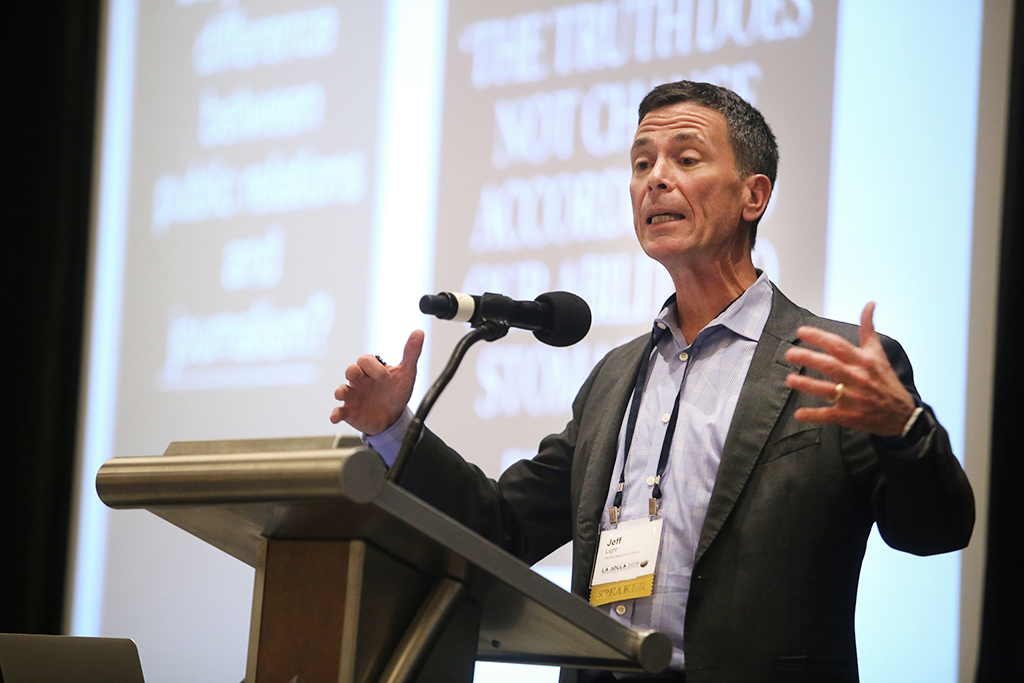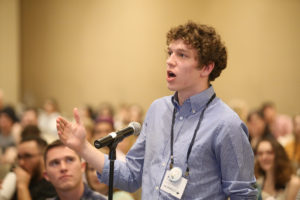
Fundamentals at the core of doing good work
Jeff Light, publisher and editor of the San Diego Union-Tribune, started off his talk reminding the 200-or-so students and instructors of the fundamentals, of the first-order rules.
- Always write the headline first. It focuses the mind.
- Always go to the scene of the crime.
- Spell the names right. Be accurate in every detail.
- Tell it straight.
These fundamentals, he said, help us do a good job of finding out what’s really going on.
“Listen to the voice of people who have something to say about it. Be open-minded about presenting all the points of view in a favorable light.”
As a former investigate reporter, he should know. Mark Witherspoon, editorial adviser at the Iowa State Daily, said it was precisely this background that made his talk interesting.
“The first thing I was impressed with was that Jeff Light was an investigative reporter that is now publisher of the San Diego Union-Tribune. That doesn’t happen that often,” Witherspoon said.
Laura Widmer, Associated Collegiate Press executive director, agreed that his background was part of what made Light a good speaker.
“Jeff Light was selected as keynote speaker because of his vast experience as a journalist from a hopper throwing the papers off the back of the truck to now the publisher of the San Diego Union-Tribune,” he said.
But the former investigative reporter didn’t spend any more time talking about the fundamentals. He spent his 90 minutes talking about things that are more abstract and more profound in journalism.
For example, he talked about the rule of perverse osmosis and the difference between public relations and journalists.
“Unfavorable numbers tend to get worse and worse. When things start going to hell, the next step in the series is even one step closer to hell,” he said.
As applied to journalism, he pointed out that as the number of journalists has decreased over time, the number of public relations professionals has increased. It’s a profound issue he said, an issue of which students need to be aware of as they enter the industry.
“As a society we are paying an increasing premium for propaganda,” he said noting that more and more governmental agencies are hiring their own PR people instead of relying on journalists to cover the actions of the government. But journalism, he reminded the audience, is different from public relations.
Alex Fregger, a student at Anne Arundel Community College, later reflected on the opening.
“If those figures about journalist employment numbers were correct then we as an industry need to adapt or follow the trend of perverse osmosis until journalism as we know it is not how we’ll know it in the future,” Fregger said.
“Part of the definition of journalism is that you will always choose the truth over the cause,” Light said, while those working in public relations are loyal to the company, to their boss. “I’m not saying PR people are bad. They are doing a different job than journalists.”
He also discussed how the message is shaped by the medium and that the printing press, television and social media were all catalysts to globalization.
“Social media has turned out to be more powerful than television,” he said. “It turns out to be a pretty volatile space. Untruths move more quickly than truths. Fear and anger move more than insights and solutions. It’s a real behavioralist’s laboratory.”
Which led him into a discussion about truth and Ghandi’s mantra, “Truth never damages a cause that is just.”
Light, respectfully, disagreed.
“My experience is that the truth OFTEN will damage a cause that is just. Journalists are signed up for two things. Advancing the cause of justice and the pursuit of the truth. They’re not always fellow travelers.”
Nevertheless, Witherspoon emphasized that a key point of his talk was about reporting the truth.
“He talked about the importance of journalists seeking the truth,” Witherspoon said. “That’s exactly what we do. That should be our mission in life.”
Widmer agreed.
“The main thing is focusing on that the truth matters, and it is so important today that we stand by the truth, report the truth, and make the truth stand for nothing less than the truth,” she said.
His next point, however, made the audience take notice: There are alternative facts.
“In spite of the way it strikes us in the light of current affairs, there are almost always alternative facts. That word alternative facts came to mean lies. Lies are not alternative facts. It’s important not to lose sight of the fact that there are almost always alternative facts.”
For example, he cited the debate regarding the ongoing debate about security at the border, only about 30 miles from where he was talking. While one side of the discussion, he points out, says detentions are down, there are still 800 a day. And if you look at it over decades instead of years, they are up “like 14 times.” If you look at it by border sector, “the Southwest has like 1,000 times more. Deaths are spiking.”
Importantly, he said, the same facts might mean different things to different people.
“That’s the essence of news.”
Additional reporting and photography by Klaus VanZanten, Utah State University
[slideshow_deploy id=’5356′]

STUDENT RESPONSE
All that said, what the students in attendance wanted to know was, well, how to get a job in journalism.
Alex Fregger of Anne Arundel Community College in Maryland asked, “What is the most important thing for college students going into the industry?”
Light said student should show work, get internships and produce stuff.

This is wonderful, Bradley! Thanks so much for sharing it with me.